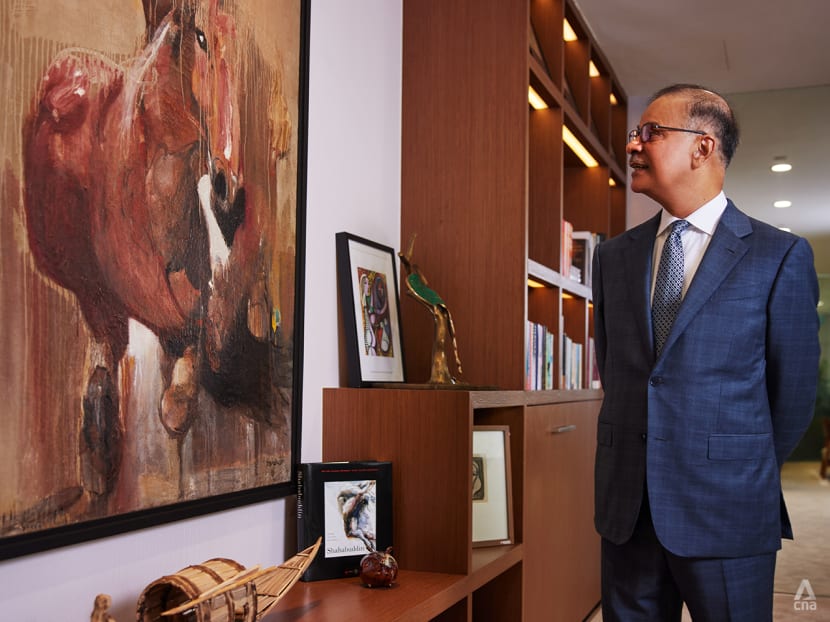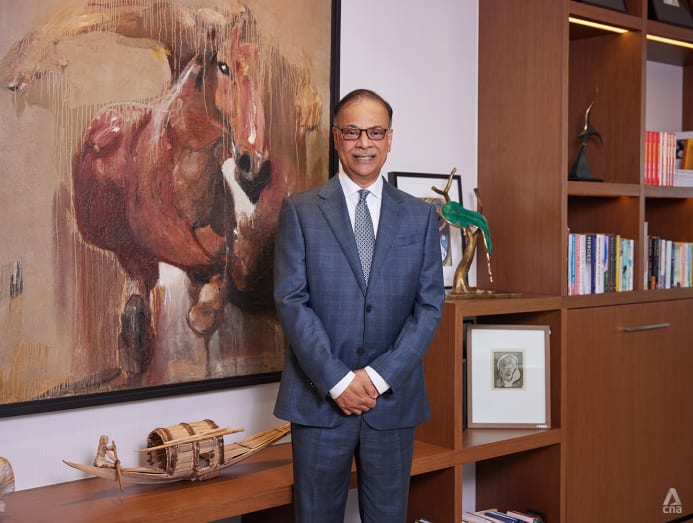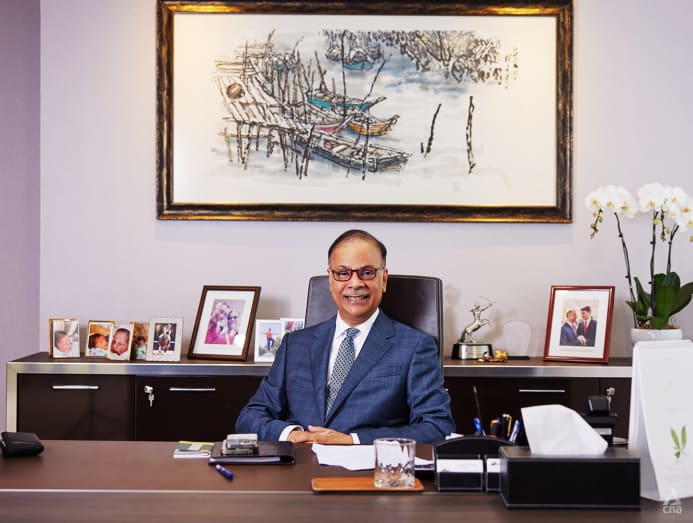Muhammed Aziz Khan, founder of Bangladesh’s first independent power producer Summit Power International, lived through the Bangladesh Liberation War of 1971. Today, he is known as one of his country’s most illustrious businessmen, and is also an avid connoisseur of art.

Muhammed Aziz Khan is a philosophical man. One of the first things we talked about as we sat down for a chat in his Singapore office is the advent of technology.
In the last couple of the days, the 68-year-old had been tinkering around with ChatGPT. “As a matter of curiosity, one of the questions I asked ChatGPT was how to be successful in life. That’s the question young people tend to ask me,” quipped Khan. “It gave me the same answer I have been giving them in the last 10 to 15 years – which is hard work and perseverance.”
Khan’s personal art collection – which adorns the walls of every room of his company’s office premises – is a reflection of these values. Born in Bangladesh, Khan is the founder of Summit Power International, the country’s first and largest independent power producer. The company is headquartered in Singapore. Its parent company, Summit Group, is the largest infrastructure conglomerate in Bangladesh. Aside from energy and power, it also has companies in communication, shipping, trading, real estate and ports.
One of the artworks that caught my eye in Khan’s personal office is a painting by Bangladeshi artist Shahabuddin Ahmed. Titled Horse Racing, it depicts the scene of a man attempting to grab hold of a horse. “To me, as told by the artist himself, the horse represents time and the man represents a person’s desire to hold on to time. But he never succeeds, as time moves faster than his ability to catch it,” Khan explained.
Also taking pride of place in his office, right above his desk, is a painting by celebrated Singaporean centenarian artist Lim Tze Peng. “The painting showcases a scene of old Singapore some 40 years back. These boats featured in the painting have today transformed Singapore into a major shipping hub,” shared Khan. The painting serves as inspiration for Khan. From his office, a 360-degree view of modern Singapore is visible – a reminder of just how far the tiny city has come.

Born in 1954, Khan grew up in tumultuous times for his home country. As a youth, he survived the Bangladesh Liberation War of 1971 – a revolution and armed conflict sparked by the rise of the Bengali nationalist movement in East Pakistan, which ultimately resulted in the independence of Bangladesh.
“I was horrified during the war. How could men kill other men in cold blood?” he reflected. “I saw firsthand friends and neighbours shot dead because of their country of origin or the languages they speak.”
Once, while driving his family vehicle, Khan recalled being shot at twice. “The military wanted to take the car for their own use. I tried to drive fast but they shot the vehicle in the back and I stopped,” Khan explained. He desired to join the fight, but his father had been arrested and tortured by the military, discouraging him from doing so. “The learnings from surviving war is that you become a peaceful person. I hope I have been able to embody that,” he added.
Despite the hardships, “I am very privileged to have grown up going to good schools,” said the third of seven boys. “My parents provided for us. I had a good childhood and today, all my six brothers are well-educated and are good human beings. I was good at sports, I played badminton, table tennis and was the champion of the 100-yard race.”
Khan graduated with a master’s in business administration from Dhaka University. His experiences in war ingrained in him a desire to help rebuild his country. And so, at just 18 years old, he ventured into business, travelling to Singapore for the first time while working alongside a friend who had set up a wholesale business importing plastics into Bangladesh. He also began exporting fertiliser and later on, became a manufacturer after buying a plant to make PVC shoes.

Through the course of his business dealings, Khan often faced delays in port, caused by chronic power brownouts in the country. He ended up having to pay extensive demurrages on many occasions. So he went to the port authorities with an offer – “Let me set up a power plant for you, so that the ships don’t need to stay at port for longer than they’re supposed to.”
Khan moved the company’s headquarters to Singapore in 2016, but he has been a permanent resident of this country since 1988.
In the course of the last few decades, Khan has cemented his name among his country’s most illustrious businessmen. He is also a well-respected philanthropist, who has contributed to causes in education, healthcare, and social welfare.
According to the 2022 Forbes Singapore Rich List, Khan is the 42nd richest man in the country, with a net worth of US$1 billion (S$1.3 billion). Business chops aside, he is the father of three daughters, and a doting grandfather of five. Besides his art collection, photos of his grandchildren are also displayed around his office.

